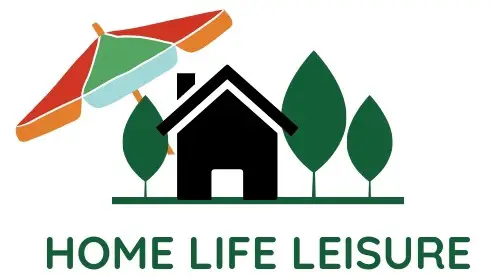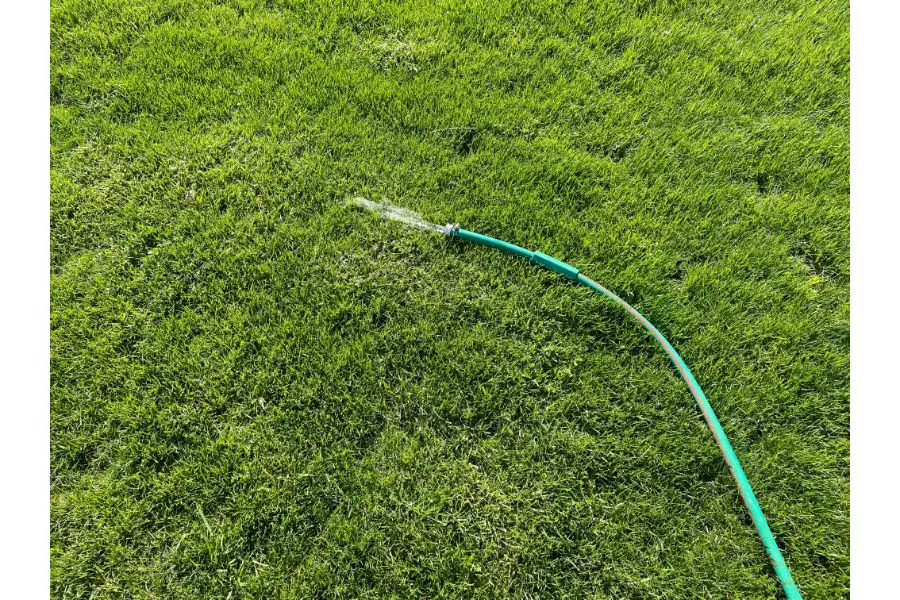The sounds of splashing in the pool are tell-tale signs that summer is here. Pools are a great way to keep cool while having fun in the sun.
With all the splashing that typically occurs in pools, it often sparks the question: Can pool water kill grass?
The short answer is no; pool water doesn’t typically kill grass. This is because the quantities of chemicals, especially chlorine, in those amounts are minimal, so they’ll have no effects on the health of your lawn.
However, there are definitely reasons to pause when it comes to dumping large amounts of pool water onto the grass. So, let’s dive into an in-depth breakdown below!
When Can Pool Water Kill Grass?
Whether pool water can kill the grass depends on several factors: water balance, volume, and grass species.
Many grass species are robust enough to handle at least small amounts of pool water that contains chemicals, such as chlorine. Depending on the chemical balance of the water, your lawn may actually not see any adverse effect from even larger quantities of water.
Two of the most common pool sanitizers are chlorine and bromine. The ideal concentration of these sanitizers to keep your pool clean depends on the amount of cyanuric acid (CYA) or stabilizer present in the water.
For pools with amounts of CYA at around 20, lower chlorine concentrations of 2 to 4 ppm may be acceptable. However, if the CYA is higher than 70 then you may need upwards of 8 to 10 ppm of chlorine in the water.
As a comparison, the U.S. Environmental Protection Agency (EPA) allows municipalities to supply residential water containing up to 4 ppm of chlorine. This water is not only often used for drinking, but also to water the grass.
Although many municipalities will keep chlorine well under 1 ppm, the EPA limit of 4 ppm indicates the lack of impact that residual chlorine is expected to have on grass (and on human health!).
If you’ll be draining a large amount of pool water onto your lawn, you may want to check your pool’s chlorine levels beforehand, particularly if you’ve recently shocked the pool. If the chlorine concentration in your pool is anywhere within the safe drinking water limit of 4 ppm, then you can rest easy knowing that it shouldn’t harm your lawn.
However, high levels of chlorine combined with a high volume of water may damage the grass or soil by changing the pH levels drastically. This may cause the usually bright and vibrant grass to become dull and brittle.
Even if you’re using salt water in your pool, that could also negatively affect your grass if you pour large amounts of it onto your lawn. This is because higher salt levels in soil lead to plants finding difficulty getting nutrients and water, which can also result in dead grass.
Don’t forget that flooding your yard with pool water, even if the chlorine or salt levels are low, is also a big no-no. All the excess water can kill the grass by making it a breeding ground for parasites, not to mention that the high moisture levels invite root rot.
Mosquitos are also drawn to flooded soil and grass, and they’ll be a huge pain to get rid of because they lay eggs in still water. Not a great thing to picture, right?
Why Is the Grass Around My Pool Dying?
As previously mentioned, no harm to the grass typically occurs from normal exposure pool water. However, if you notice grass is dying around the pool, that’s an alarming scenario that you can’t ignore.
In some cases, dead grass around the pool could be caused by undiluted bleach or chlorine being spilled outside the pool. This high concentration of chlorine can quickly burn the grass if left unattended to.
If you’ve accidentally spilled some bleach onto the grass, your best course of action is to quickly spray some clean water on the affected grass. This water will dilute the effect that chlorine could pose on your lawn.
Dead grass around the pool is also more likely with above-ground pools. It’s possible that the pool structure may be blocking sunlight from adequately reaching the grass, causing the lawn to deteriorate.
How to Safely Drain Pool Water on Grass?
Despite everything, it’s not necessarily a bad idea to drain water onto your lawn when the need arises to lower the level in your pool.
Plus, draining pool water on the grass can often achieve similar benefit as watering your lawn from a traditional sprinkler, if you take certain precautions.
Here are a few recommended guidelines before dumping water from your pool onto the grass:
Step 1: Check Local Jurisdiction
Before draining large amounts of water onto the lawn, it’s a good idea to check with your local city jurisdiction as to whether it’s even permitted. There may be certain laws that prevent the uncontrolled release of treated water onto lawns.
Step 2: Lower the Level of Chemicals in the Water
Once you have the OK to drain from local laws, you’ll have to start by bringing down the levels of chemicals used in your pool water. Around a week before you plan to drain water from your pool, stop adding chlorine to the water.
During this waiting period, the chlorine levels will naturally go down. Sun exposure will do most of the work for you, burning a huge chunk of it off.
Or, if you want to speed up the process, you could add some hydrogen peroxide to the water. You may also go for diluting your pool water, which will significantly lower the concentration of chlorine and other harsh chemicals in it.
To make sure that the water is ready to be reused, do a simple pH test. Ideally, you’ll want it to be between 7 to 8.
As for the level of chlorine, aim for less than 1 part per million if possible. However, even chlorine at 4 ppm really shouldn’t be harmful.
Step 2: Bring Down the Levels of Salt in the Water
If you’re using salt water in your pool, you’ll need to decrease the salinity of it so that the excess salt doesn’t harm your grass.
This is also easily achievable by diluting your pool water, then testing its salinity using test strips. You can find those online or in convenience stores.
To stay on the safe side, aim for a non-saline to mildly saline water level.
Step 3: Stretch the Process of Watering Your Grass Over Days
Now that your pool water is ready to be used on your grass, you’ll need to be extra careful about the portions you’ll be using. You can’t just empty the entire pool onto a single section of your lawn in one go as it’ll cause oversaturation with negative impact on your grass, as we’ve already mentioned.
Instead, you should try to use similar quantities of water as you’d normally do when watering your lawn.
If you have a large pool, you could consider using the siphon method with a hose. Otherwise, for a quicker process consider using a submersible pump with a backwash hose. Just remember to move the end of the hose to various spots on the lawn to avoid flooding a single location.
Otherwise, if you have a small pool, you could even consider using a bucket to transport water from the pool to the lawn.
Depending on the size of your pool and lawn, the process can take anywhere from hours to days. But, at least you’ll rest assured that you’re not damaging your grass by over-watering.
If you’re in a hurry to drain your pool, you can always use the water on other plants, too. Any trees, bushes, shrubs, and flowers in your yard won’t say no to your now-safe pool water!
Are There Plants That Tolerate High Levels of Salt in Pool Water?
The good news is that, yes, some plants have a natural tolerance for moderate to high salt levels in the water. Sure, grass is decidedly not one of those, but it’s a relief that some plants won’t require you to bring down the salt levels in your pool water after all.
This means less time and effort spent emptying your saltwater pool!
Here are some salt-tolerant plants that may already be in your backyard, not minding having a little taste of your salty pool water:
- Aloe
- Olive
- Rosemary
- Saltbush
- Oleander
- Deer grass
- Texas ranger
- Desert broom
Are There Plants That Can’t Tolerate Any Salt in Pool Water?
Yes, some plants can’t handle even the tiniest amounts of salt in their water as they’re incredibly sensitive to it.
Some of these specimens include:
- Roses
- Jasmine
- Most, if not all, fruit trees
- Hibiscus
- Jojoba
- Willow
Final Takeaway
Can pool water kill grass?
Technically speaking, pool water can kill grass if you unload huge amounts of it onto a small portion of your lawn. That’s because overwatering in general can be harmful –if you factor in high levels of chlorine or salt, it could eventually cause the grass to die.
However, in moderation, grass being exposed to pool water generally won’t see any harm. This is because pool chlorine is in a diluted state that minimizes the potential damage to the grass.
Personally, we drain upwards of 5,000 gallons of pool water onto our lawn as part of our winterization process each year. Our lawn has never shown any sign of damage from this.
So, feel free to take advantage of reusing your pool water on your grass as well as other plants in your yard. Just make sure you follow the steps listed above, and you shouldn’t have any problems.
Happy (Worry-Free) Splashing and Swimming!
Husband and father of three (actually, four if you include the pool). I’m an avid DIY-er and weekend warrior that enjoys taking up new projects around the house to help us maximize leisure right at home. I enjoy researching and sharing various tips, tricks and knowledge to help others make their home an oasis.

